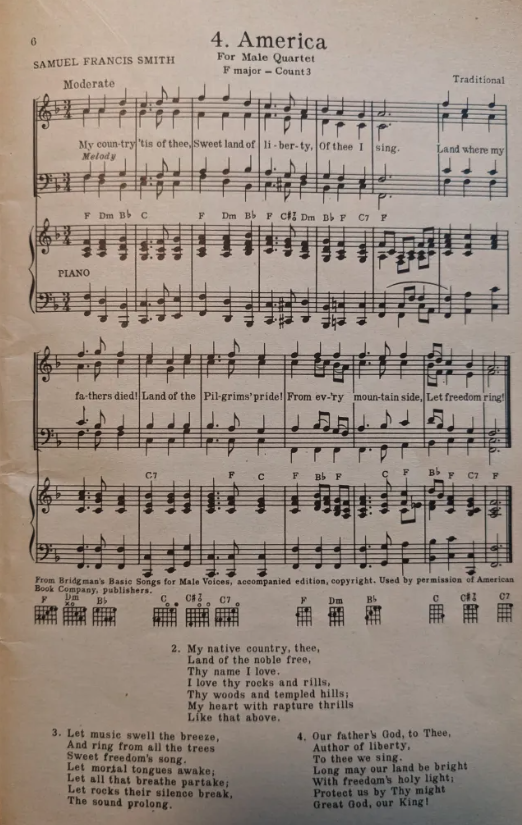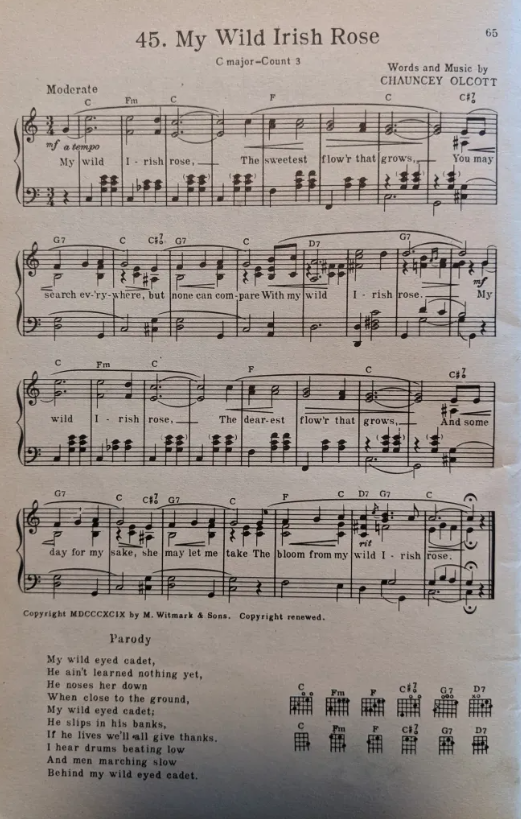Keeping the music close to home (pt 2)
In August we wrote our first part of this series on music that belonged to the Suter and Kurze families of Providence and later Cranston and Middletown. They donated a collection of music from the late 19th and early 20th centuries to Historic Music of Newport. This music included piano, violin and vocal sheet music. Keeping the Music Close to Home, Part 1 was a first glance through that collection of music. In this post we wanted to focus on some music by a Rhode Island composer and then a collection of “war” music from the Spanish-American War of the 1890s up to 1941.
Harold B. Freeman
Historic Music of Newport Collection. 0004
Harold Brown Freeman was born in Central Fall, Rhode Island in 1892. His family moved to New Bedford, Massachusetts briefly, and in 1910, the United State Census has him living in Providence, Rhode Island, with his occupation listed as “college student.” By the 1915 Rhode Island Census he is listed as living in Providence and his occupation is “music publisher.” He would go on to run his own publishing company on Weybosset Street in Providence.
Lullaby Time was composed in 1919. He also composed a number of war songs including “A Letter From No Mans’ Land” available in the Lester S. Levy Sheet Music Collection at Johns Hopkins University.
Freeman died in 1924.
War Music
Historic Music of Newport, 0006
One of the oldest war songs in the collection, “Break the News to Mother,” by Charles K. Harris.
The text on the title tells its story as related to World War 1:
The song was originally published in 1897 during the Spanish American War, when it was virtually taken up and sung by the entire nation.
The Author and Composer Mr. Chas. K. Harris, who is also the author of the world’s famous song “After the Ball,” since the outbreak of the present war, has been besieged by requests for copies of this one-time famous song, the human heart-appeal of which has kept it alive for these many years.
In response to this appeal he has issued this new edition.
The song remains unchanged with the exception of the title page and will undoubtedly take its place as an immortal classic with such songs as “Home Sweet Home” and “The Vacant Chair.”
You can hear a great recording of “Break the News to Mother” here.
George M. Cohen wrote his famous “Over There” in 1917. You can read a great article about the song here.
William J. Reilly was a sailor in the Navy during WW1 and also a vaudeville performer. He was used a lot for recruiting by the United States Navy.
You can also hear Reilly singing “What’ll we do with him, boys” in a 1918 recording here.
from the Library of Congress Digital Archives
The Adjutant General’s Office and the Library of Congress collaborated on this song book for the United States Army, and this second edition was published by order of the Secretary of War, in 1941. Here are two examples of what you find in the Army Song Book. You would not be surprised to find the patriotic songs like “America” in this book, but there are a number of popular songs of the day as well, including “My Wild Irish Rose.” But notice the parody lyrics at the page!
The collection of music donated by the Suter and Kurze families of Providence and later Cranston and Middletown is vast and covers music history beyond the state of Rhode Island. As we work towards cataloguing this music and other collections as we get them, our goal is to make those available to the public. This music not only needs to be preserved, but it needs to be shared. Music needs to be heard more than it needs to be seen!







